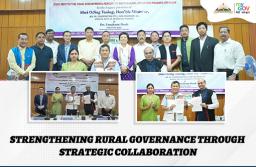‘Hamara Arunachal Abhiyan', a mass movement under the Government of Arunachal Pradesh was launched by the Hon'ble CM, Shri Pema Khandu on the occasion of the 150th birth anniversary of Mahatma Gandhi, that targets to educate and eradicate the evils of our society.
‘'Hamara Arunachal aims at being the cradle of public and administration joining hands together for building a cohesive atmosphere and a better path to lead the state'' with the key highlights to:
-involve all sections of the society in managing law and order
-aware people about various laws
-change their mindset besides promoting police-public partnership
-remove the social stigma attached to police
-promote coordination between communities to pave the way for communal harmony in the state.
-to bring about a police-public partnership for better law and order maintenance
-instill a sense of security and confidence among entrepreneurs, outside investments and tourists
-pave way for better development processes and to make Arunachal a safe state.
As a platform for the masses, this project will underline the eradication of problems faced by the people and at the same time be a learning gateway for ushering in positive attitude and development in the lives of the people and the state as a whole. In the process, the project will also aim at educating the masses and curbing the menaces that have been disturbing us.
Hamara Arunachal Abhiyan would carry within it many sub-campaigns which would, in turn, reflect and delve into each social issue plaguing in the society. The sub-campaigns include:
-Vigilant people
-Responsible Arunachal
-Domestic violence and crime against women
-Child labor
-Arunachal against drug abuse
-One Arunachal unified Arunachal and
-Traffic management
A state is connected by the trust and coordination between the administration and its citizens. The campaign aims to carry, execute and manage the well-being of the society by the people and for the people. It is not the responsibility of the government alone to bring positive changes or development in the society, rather citizens must also start performing their fundamental duties before pressing for their fundamental rights.
Any breakdown in law and order discourages investment, which is vital for the economic development of the state. To maintain law and order in the state, people need to be made equal participants in the development process.
MyGov Arunachal invites citizens to share their views on how 'Hamara Arunachal Abhiyan' movement can be a transformational impact on our lives.













BrahmDevYadav 3 years 4 months ago
What age wastes the most food?
18-34-year olds waste proportionally more food than other age groups and so particular attention needs to be given to helping young people change their habits in order to waste less food.
BrahmDevYadav 3 years 4 months ago
How do schools reduce food waste?
The smarter lunchroom strategies show that reduce food waste are:- cut up whole fruits and veggies, improve meal quality and schedule recess before lunch. Cutting up whole fruits and veggies makes them easier for children to eat and more appealing to eat as well.
BrahmDevYadav 3 years 4 months ago
Which practice helps in reducing wastes?
Recycling saves energy, helps keep materials out of landfills and incinerators and provides raw materials for the production of new products. When waste cannot be prevented, recycling is the next best option. Recycling is more than extending the life of landfills.
BrahmDevYadav 3 years 4 months ago
How does reducing food waste help the economy in State?
Benefits of Less Food Waste:-
Cost savings on labor through more efficient handling, preparation and storage of food that will be used. Cost savings when purchasing only as much food as needed and avoiding additional costs of disposal. Reduced methane emissions from landfills and a lower carbon footprint.
BrahmDevYadav 3 years 4 months ago
Why we should not waste food 5 points?
Wasting food is bad and destructive for the Earth's environment. When food rots with other organics in landfill, it gives off methane gas, which is 25x more powerful than carbon pollution. Food waste can also cause infestation of rodents which can cause disease and sickness to spread to everyone.
BrahmDevYadav 3 years 4 months ago
How can we reduce waste at home and school?
Encourage waste-free lunches by cutting down on food packaging, single-use and disposable items and so on. This can focus on packed lunches as well as school dinners. Encourage healthy eating in the school by recommending no crisps, sweets or fizzy drinks days or banning soft drinks. All of these items produce waste.
BrahmDevYadav 3 years 4 months ago
What is the best method of waste disposal at home?
Composting: Recycling organic wastes such as vegetable peels, waste food and leaves, by burying them in compost pits is called composting. It is a simple and effortless method of recycling organic wastes. The biodegradable wastes are degraded by small microorganisms such as bacteria and fungi.
BrahmDevYadav 3 years 4 months ago
What are the three methods of waste disposal?
1.Recycling. Incineration.
2.Other thermal treatment plants. Chemical-physical and biological treatment.
3.Chemical-physical and biological treatment. Landfills.
4.Landfills, Collection and logistics.
BrahmDevYadav 3 years 4 months ago
Why do we need to reduce waste?
By reducing the amount of waste you create, we help prevent pollution and protect the environment. We also limit the amount of waste going to landfill, preserve natural resources and save money.
BrahmDevYadav 3 years 4 months ago
What are the benefits of composting food waste?
Benefits of Composting Food Waste:-
Enriches soil, helping retain moisture and suppress plant diseases and pests. Reduces the need for chemical fertilizers. Encourages the production of beneficial bacteria and fungi that break down organic matter to create humus, a rich nutrient filled material.